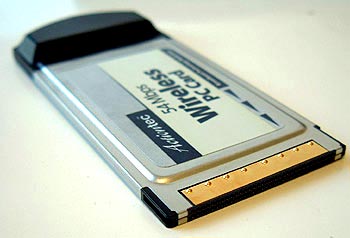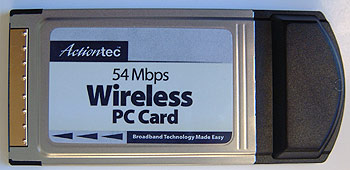
|
The FCC licences 5.25 - 5.35 / 5.65-5.85GHz to high power radar systems which is about the only thing left to possibly cause interference from what we can tell.
82% Rating: 
|
|
|
|
Home >
Reviews >
Networking >
Actiontec HWS05490-1 |
|
|
The PCMCIA Cards
| actiontec
-pcmcia |
|


|
Hardware Installation:
The PCI card installs just as
another card does into a free expansion slot. The drivers can be loaded up from
the CD which Actiontec include with the package in a mater of moments.
Configuring the wireless adaptors properties in WindowsXP is accomplished via
standard windows menus and while they are not as nice to deal with as a custom
piece of software they keep the cards lean and relatively trouble
free.
Curiously, we had some rather
tough problems reconnecting to the WAP after encryption was apparently engaged,
and nothing in the documentation or on Actiontec's website was able to solve the
issue. In the case of this equipment I'd be apt to side with a more simple
ad-hoc setup than the WAP-AP which is troublesome to configure because of its
reliance on a browser interface.
In any event, we eventually
triumphed over the settings issue and were able to run NetIQ's Qcheck utility to
test out the connection along with a few time file transfer tests.
The
average throughput of each system from router to PCMCIA card was checked
using NetIQ's QCheck utility. A simple 11.8MB data transfer test was also
conducted to measure approximate data-transfer times. Each test was conducted
three times and the average results recorded.
When using QCheck to test the throughput we
isolated the endpoint computer from the rest of the network by connecting it to
the WAP router directly. If the computer is connected to the internal network,
the results would tend to be augmented by the other background traffic. All
Qcheck tests were conducted with a Data size of "1000bytes".
| Wireless Network Setups |
| |
Actiontec
802.11a |
SMC 802.1b |
| Average Throughput |
27-41Mbps |
4.899 Mbps |
| Response Time |
2-6ms |
5ms |
| 11.8Mb Test file transfer |
5sec |
13sec |
|
|
|
| WEP Average Throughput |
20.253 Mbps |
2.550 Mbps |
| WEP Response Time |
4-7ms |
6ms |
| WEP 11.8Mb Test file transfer |
9 sec |
19sec |
| 10/100 Wired Ethernet |
61.5 Mbps |
| Wired Response Time |
1ms |
|
|
|
Moving from the 11Mbps speed
of 802.11b to the 54Mbps speed of 802.11a brings about a very nice boost in both
throughput and data transfer tests. Comparing the Actiontec 802.11a
equipment up to some reference SMC 802.11b gear we can see that the gains are
fairly significant. Also worth noting is that the average throughput for our
802.11a tests varied from one moment to the next over a larger range than the
802.11b equipment would.
For this reason, the listed
range is 27-41Mbps and not just simply 34Mbps. The actual upper limits in some
cases met 50Mbps, and dipped as low as about 24Mbps, but for the most part the
signal supported the 27-41Mpbs throughput.
Data transfer times for the
11.8MB test file came in at a speedy 9 seconds compared to the 19 seconds of the
SMC equipment, and average of about 25-30 seconds for some other manufacturers
we looked at in a 802.11b round up recently.
With a retail price for the
access point of about $220 USD (check CDW.com) and $115USD for the PCMCIA cards
the equipment is more expensive than standard 802.11b, but then again you do
get a better transfer rate over shorter distances. 802.11a does not have
the same range as 802.11b, and the Actiontec equipment is only rated for about
100 feet indoors. Given the size of most consumer houses though, this is more
than adequate for good coverage assuming a fairly open layout is available.
Doors, walls, and other metal objects, or even people can degrade signal strength
and effect transmission rates.
Overall, the Actiontec 802.11a
equipment is a nice upgrade from the current crop of 802.11b gear, and with WEP
encryption does offer a similar and better levels of security (40-bit WEP,
128-bit RC4, 154-bit RC4). Cool technology for smaller wireless spaces where
mobility is paramount and range is not as important.
|
